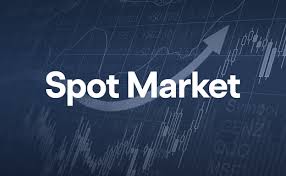Spot market refers to the place where financial instruments are traded for cash for immediate delivery. Assets traded in the spot market include commodities, currencies, and securities. Delivery occurs when the buyer and seller exchange cash for the financial instrument. A futures contract, on the other hand, is based on the delivery of the underlying asset at a future date. Exchanges and over-the-counter (OTC) markets may provide spot trading and/or futures trading

What is a Spot Market?
Spot markets are also referred to as “liquid markets” or “cash markets” because transactions are instantly and essentially exchanged for the commodity. While it may take time to legally transfer funds between the buyer and the seller, such as T+2 on the stock market and in most currency transactions, all parties agree to trade “right now.”
A non-spot or futures deal is agreeing on a price now, but the distribution and transfer of funds will take place later. Potential deals in contracts that are about to expire are also sometimes referred to as spot trades since the expiring deal means the buyer and seller can immediately swap cash for the underlying asset.
Non-Spot Bargain
A non-spot or prospects bargain is conceding to a value now, however, the dispersion and move of assets will happen later. Expected arrangements in gets that are going to lapse are likewise some of the time alluded to as spot exchanges since the terminating bargain implies the purchaser and merchant can promptly trade money for the fundamental resource.
Tradebulls is a registered brokerage firm and has emerged as one of the major stock trading platforms in recent years. The biggest advantages are our dedicated services that have been formulated for the best financial practices. The kind of fiscal consultancy that is given to budding investors and new traders here is unmatched and unparalleled.
Spot Case
A spot showcase is the place money related instruments are traded for sure-fire conveyance, for example, wares, monetary forms, and protections. Conveyance, here, implies money trade for a budgetary device. In correlation, a fates contract depends on the conveyance of the basic resource sometimes not too far off. Over-the-counter (OTC) markets and trades may give spot exchanging or potentially fates exchanging. The current cost is considered as the spot cost of a monetary instrument. The value an instrument can be quickly sold or bought at. By posting their purchase and sell requests, purchasers and merchants fabricate the spot cost. In fluid markets, as requests are filled, and new ones enter the commercial center, the spot cost may move constantly. Spot markets are the places where, for instance, gold is purchased or sold for practically prompt settlement. These business sectors don’t have a physical area, rather they are all the more an appropriated showcase comprising of bullion advertising merchants from everywhere throughout the world who exchange gold inside a typical arrangement of rules. Normally, there are two sorts of spot markets, to be specific trade and over the counter (OTC).
Trade-specific – It alludes to a market where vendors just as the speculators meet up on the exchanging stage for managing different money related instruments and products.
Spot Price
The current price is considered as the spot price of a financial instrument. It is the price that an instrument can be immediately sold or purchased at. By posting their buy and sell orders, buyers and sellers build the spot price. In liquid markets, as orders are filled, and new ones enter the marketplace, the spot price may shift by the second.
Spot Market and Exchanges
Exchanges put brokers and traders who buy and sell commodities, shares, futures, options, and other financial instruments together. The exchange offers the current price and amount available to traders with access to the market on the basis of all orders made by participants.
The New York Stock Exchange (NYSE) is an example of an exchange where traders buy and sell stocks. This is a spot market. The Chicago Mercantile Exchange (CME) is an example of an exchange where traders buy and sell futures contracts; this is a futures market.
FAQs
What Are Examples of Spot Markets?
Many commodities have active spot markets, where physical spot commodities are bought and sold in real-time for cash. Foreign exchange also trades in the spot currency market where the underlying currencies are physically exchanged following the settlement date. Delivery usually occurs within two days after execution as it generally takes two days to transfer funds between bank accounts. Stock markets can also be thought of as spot markets, with shares of companies changing hands in real time.
What Is a Spot and Forward Market?
A spot market is where spot commodities or other assets like currencies are traded for immediate delivery for cash. Forward and futures markets instead involve the trading of contracts where the purchase is to be completed at a later date.